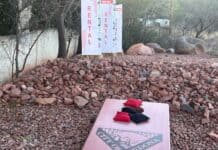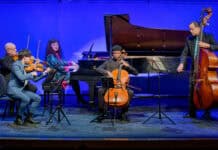
After over two years of work, the Yavapai County Board of Supervisors unanimously approved a new conditional use permit for Verde Valley School during their April 19 meeting.
Outgoing VVS Head of School Paul Amadio said that securing the permit ranked second only to managing the effects of the COVID-19 pandemic as his biggest challenge during his eight years at the school. He is now relocating to Boston.
“I’m over the moon,” Amadio said. “This is very important for the school and I think the community after the amount of work that the whole community did, not only the school, which was a three-year process to get this plan in place.”
Max Licher of Design Group Architects explained that the new permit sets out a long-range vision for the school, with future development to be determined by funding availability.
About 90% of the potential future buildings at the school will be located within the existing campus, which is not a significant change from the school’s existing conditional use permit. The school’s main reason for applying for a new permit was to reincorporate the empty half of its property, which was formerly used by Camp Soaring Eagle, within its overall plan.
Camp Soaring Eagle, a camp for children with severe illnesses, went bankrupt in 2007, after which the land it had leased from the school and abandoned the three buildings it had constructed. This forced VSS to make a number of decisions about what to do with the land. Licher said the school decided to keep all of the property and leave it mostly undeveloped. Although the entire property is owned by VVS, the school and the camp operated under two separate CUPs.
Regaining access to the roughly 7,500 square feet of the vacant Soaring Eagle buildings was the primary motivation for VVS to redo its permit. The school sees renovating these buildings as the most cost-effective way to add more classroom space rather than building new structures.
“What the school is going to do with their long-term plan is only about a third of the actual building square footage that Camp Soaring Eagle had previously been permitted for,” Licher said. “Overall, there’s a significant reduction of about 80,000 square feet less building in the current CUP in the two previous ones combined.”
Amadio elaborated that while VVS is a nonprofit school, it is also seeking additional revenue and recreation opportunities for residents by allowing people access to mountain bike and equestrian trails through its property and that VVS is going to have to bolster security and staffing.
Upcoming projects at VVS will now include renovating the existing Camp Soaring Eagle buildings for classrooms and meeting space, building a new community center with a kitchen for student events as well as weddings and farm-to-table events, a new orientation center, an expansion of the current gardens and orchards, the construction of a new botanical garden, and building seven new cottages and 10 new dry campsites, which be rented only to alumni, not the general public. New rock-climbing and skateboarding areas will be constructed for student use and will be available through a day pass.
The equestrian facility will be expanded and will not house more than 40 horses, which is about 33% smaller than the previous 1,500-square-foot facility VVS had considered. The school plans to eventually add an equestrian challenge trail on the far northern end of the parcel.
Finally, the school’s trail system will be expanded “within the confines of the existing trails, [with] a maximum of 50 day passes per day [that] will be allowed,” Yavapai County planner Becca Sirakis said.
VVS’s planning and outreach efforts drew unanimous praise from the Yavapai County Planning and Zoning Commission as well as the board of supervisors.
“I don’t think I’ve seen a more responsive applicant during my tenure in reducing as requested [the[ number of activities [and] type of activities,” District 3 Supervisor Donna Michaels said during the meeting. “ It started out with a great deal of opposition, because it appeared to be more commercial than educational. And this applicant has proven through their negotiations, and their agreement to change some of the offerings, that their mission is solid as educational, and that it actually enhances the area.”
Michaels went on to point out that traffic had been one of residents’ major concerns with the school’s plans. Amadio commented that as soon as VVS applies for a permit to begin improvements to the property, it will have to complete a traffic study, which he anticipates will occur in the next 18 months.
Part of VVS’s expansion will include an additional 35 to 50 parking spaces. The school will ensure that any parking takes place on graveled surfaces or a surface that would not lend itself to fire, such as dry grass.
Residents’ other major objection to the new permit was the possibility of increase noise, which VVS addressed by agreeing to prohibit amplified music. Amadio anticipated that noise from weddings will not be an issue, as the campus has held weddings for decades at its nondenominational chapel and the venue averages only about two wedding receptions per year, which are never done when students are on campus.
In the future, “the fire department wants a secondary access [road] and Camp Soaring Eagle had done the initial grading work for an east-west road that would connect out to Verde Valley School road and the fire department is going to require that we complete that prior to being able to being issued any more building permits,” Licher said.
Additionally, the school will need to complete a wastewater system assessment of the entire property in order to account for the wastewater from the three new buildings.
“I think Sedona is a very good representative of community,” Amadio said about ending his time in Sedona. “I think that VVS has really been integral to the community through the economy, through all the service that our kids do … What I can take from this experience was creating good human beings who will become global citizens to make a difference in the world in the future.”


















